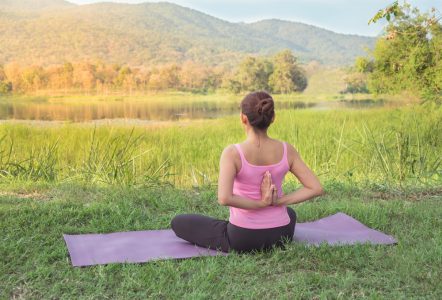The importance of self-care during Covid-19

Self-care during Covid-19
Posted on Fri May 15, 2020
Dr Monica Lascar, Private Consultant with a specialism in stress hormones, mental health and men and women’s health, tells us how we can keep mentally active and happy throughout lockdown with self-care techniques and research.
Society stresses us out
Stress accounts for 40-60% of consultations in primary care and in the UK 40% of GP consultations concern mental health issues (from a survey done by the Mind charity); GPs often find their jobs stressful (ref 1), yet they may feel unprepared to deal with stress-related consultations given the time constraints of the consultations (ref 2).
The WHO recognised burn out as a medical condition in 2019.
All this even before Covid-19 started.
Hormones and stress – how are they linked to self-care?
I have been fascinated about stress for years, partly because you get interested in something when you come to it in your own life but also because I feel that there is so much knowledge out there now from neuroscience and biology that has not yet translated in clinical practice.
I work in the field of hormones therapy and cortisol, the main stress hormone involved in chronic stress is the ruler of many hormones – able to disrupt the most perfect hormone balance. Cortisol can interfere with thyroid function, can make menopause a more difficult transition, may even limit the benefits of HRT, increase the risk of heart disease and can increase insulin resistance and weight gain and risk of type 2 diabetes.
Our bodies have an incredible ability to adapt to stress. Each and one of us, is, evolutionary speaking, from a long line of survivors and it is this instinct above all else that we are able to do best. We do it, often unconsciously, pushing through the next task on the to do list, another coffee, with an incredible ability to switch off our physiological needs often at the cost of our happiness.
The science behind it
When faced with a threat (real or imagined) a signal gets sent to the brain (Hypothalamus), which then sends a messenger (hormone) to the Pituitary, this sends a message to the Adrenals that produce adrenaline and cortisol. This forms your HPA axis. This enable the heart to beat fast and pump more blood to the muscles so we can run faster, digestion switches off and clotting increases so you can heal faster if injured. This acute stress response is driven by the sympathetic nervous system and it is meant to be short lived and switch off once we return to safety.
If the threat does not go away, the HPA axis becomes dysregulated, unstable, on a repeat loop. Ongoing stress comes with a sense of hypervigilance which can result in irritability, nervousness, rumination, insomnia or mental health issues.
The ‘rat race’
Hans Selye studied stress and defined in 1956 the three stages of chronic stress, which he called General Adaptation Syndrome by experimenting on rats and subjecting them to awful conditions, be it cold exposure, prolonged running in a spinning wheel or forcefully immobilising them. Regardless of the type of stress the rats were subjected to, their bodies reacted in the same way.
The first stage was alarm- adrenaline driven, with blood flowing to the muscles and the heart beating fast. It then followed adaptation, when adrenaline and cortisol became raised but this could not be sustained indefinitely and exhaustion followed. In this final stage, autopsy revealed enlarged adrenal glands (where stress hormones were produced), small lymph nodes and thymus- essential organs for the immune function and multiple stomach ulcers.
There is no surprise that our modern ‘rat race’ can have consequences to our health.
Why is self-care relevant now with Covid- 19?
Probably to start with, when the virus first came along, we all felt the adrenaline and cortisol of that initial ALARM response. Some stockpiled food (or toilet paper!), new hospitals were built within days, the NHS re-organised itself making changes that would have otherwise taken months if not years. We felt we’ve got this. Adrenaline and cortisol are powerful fuels.
How did you first respond? Did you show any supernatural powers on adrenaline?
ADAPTATION then followed. 95% of GP consultations have moved online (95% were face to face previously), home schooling started, we all adapted to life on Zoom. Old problems faded into the distance (remember Brexit?) and we refocused and re-organised our lives in incredible ways.
What are you most proud of in the way you coped and adapted?
The next stage would be exhaustion but we do not need to get there. Not with the right understanding and tools. I know people on the front line may be more at risk, not just from the long hours but grief, fear and other difficult emotions may take their toll. But everyone is at risk as work will expand to fill all the available space and blurred boundaries between work and home schooling and doing housework and countless hours on screens will make days merge into each other and can feel exhausting, often with a rollercoaster of emotions.
Where are you now? How are you feeling? Whatever it may have brought up for you, I am sure you are not alone in feeling that. Let it be and bring some curiosity to it if you can. And continue reading on…
As we may begin to realise now that Covid-19 may not go away that soon as society plans to re-open, the sense of hypervigilance will remain.
How to adapt
I think what makes for successful adaptation rather than exhaustion is switching the sympathetic nervous off, switching the alarm off and moving into the nervous system’s safety mode- the parasympathetic nervous system.
The main component of this is the vagus nerve, which can act as a literal break. The branch of the vagus to the heart can slow the heart down (the vagal break), whereas other branches to the gut allow for more blood flow to improve digestion; the breathing slows down allowing more oxygen into the cells.
Much research has gone into the vagus nerve lately (Steven Porges studied this for the past 4 decades!). It holds the key to the power of creating an inner sense of safety and his research is transforming trauma therapies (a recent article – ref 3).
I trained in Clinical Applications of Polyvagal theory last year and it was perhaps the most powerful explanation of how our nervous systems are wired.
But I hear you; how can you feel safe now, given all that uncertainty? We don’t have a vaccine, we may struggle with financial uncertainty, and our usual coping mechanisms have been largely dismantled (pubs/restaurant, travel, live entertainment). Social isolation is set to continue and this lack of connection can be taxing on our nervous system. Hypervigilance is not going to go away, not unless we make a conscious effort to cultivate safety. And whilst we have no influence on our outer (crazy) world, cultivating safety within ourselves is an even more powerful skill.
This is the biological basis of selfcare, a step you can consciously cultivate to take your foot off the accelerator (the sympathetic nervous system) and onto the (vagal) break.
Moreover, research shows that people who take time to recharge and restore are more creative, happier, and more successful. They have better emotional regulation and are more resilient.
Self-care
I believe without prioritising self care we are all at risk of exhaustion, which may be felt not just physically but especially mentally.
You can take my self care questionnaire here.
Look at areas you scored less than 3 and spend a bit of time writing down what can you change, add or let go off to improve your wellbeing.
My current personal favourites are:
- Mindfulness 10 minutes at the beginning of the day and a gratitude round with the family at the dinner table (everyone answers 3 questions- what I have learned today, what made me happy, who have I helped today). After that initial eyeroll (I have teenage kids) I love how the atmosphere changes as we all answer the questions.
- Taking time to breathe deeply throughout the day- the longer the outbreath the more you engage the vagal break- breath in counting to 4 hold to 5 and out slowly counting to 8
- Spending time in nature, even if only once per day, really savour that time by taking in the sounds of birds (and no airplanes), the blue sky, the fresh air (is it just me or is much cleaner already?)
- Boundaries – work in progress, currently allowing a transition time from work to home, building new routines for new circumstances
It is my hope that we will come out from this challenge more connected to ourselves and each other, clearer to what matters, and – as every challenge can be an opportunity – a renewed sense of purpose may emerge but only if you nourish yourself through it.
What will you do to look after yourself better this month?
References
- 1. https://practicebusiness.co.uk/the-causes-of-stress-among-gps/
- 2. https://www.ncbi.nlm.nih.gov/pmc/articles/PMC4286362/
- 3. https://www.theguardian.com/society/2019/jun/02/stephen-porges-interview-survivors-are-blamed-polyvagal-theory-fight-flight-psychiatry-ace
Check out Oryon Connect’s social media pages for more great content like this
Share this article
Most Recent
All you need to know about getting a private chest X-ray
Posted on Thu Feb 22, 2024
Posted on Wed Jan 17, 2024
Posted on Mon Dec 18, 2023
Stay up to date
If you’re interested in keeping up with what we’re doing, just leave your email address here and we’ll send you periodic newsletters and other updates.








